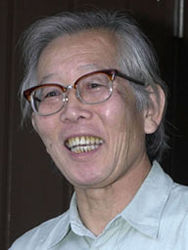|
 The
Royal Swedish Academy of Sciences on October 12 announced the awarding
of the Nobel Prize for Chemistry to Hideki Shirakawa of Japan and two
Americans for their "revolutionary discovery" that plastic can be made
electrically conductive. The
Royal Swedish Academy of Sciences on October 12 announced the awarding
of the Nobel Prize for Chemistry to Hideki Shirakawa of Japan and two
Americans for their "revolutionary discovery" that plastic can be made
electrically conductive.
Shirakawa, 64, a professor emeritus
at the University of
Tsukuba, was chosen the Nobel laureates along with Alan J. Heeger,
64, of the University of California at Santa Barbara, and Alan G. MacDiarmid,
73, of the University of Pennsylvania. The three researchers will share
the prize money of 9 million Swedish kronor (about 100 million yen).
The academy, according to the citation,
named them for the "discovery and development of conductive polymers"
that are now in use in such things as antistatic substances for photographic
film, computer screen shields, and small television and cell phone display
monitors, reversing the conventional belief that plastics, unlike metals,
cannot conduct electricity.
Shirakawa is the ninth Japanese
Nobel laureate and the second to receive the prize for chemistry after
Kenichi Fukui in 1981. The son of a practicing doctor in Gifu Prefecture,
central Japan, Shirakawa liked science most among school subjects and
got high marks in it. "I was interested in how to make various kinds
of plastics" that found their way into people's daily life in the postwar
period, he said.
In a composition written before
graduating from a junior high school, Shirakawa wrote that his dream
was to study chemistry and physics at a university and create new plastics.
One of his friends said Shirakawa
had been "an academic type since high school days. He always told
us he wanted to be a scientist." Another friend said he was a good-tempered
and well-mannered boy. "He was smart but never showed off," the friend
said.
Shirakawa and his like-minded friends
occasionally took chemicals out of a science laboratory and conducted
explosion experiments on a dry riverbed, some classmates recalled.
Shirakawa is a relative on the paternal
side of the grandmother of Naoko Takahashi, who won the gold medal in
women's marathon at Sydney Olympics.
Shirakawa said he is sad to say
that many young people nowadays seem to be losing interest in science.
He wants kids to witness the actual phenomena of physics, chemistry
and biology "to get a real feeling of nature," Shirakawa said.
Photo: Shirakawa shows his delight at being awarded the
prize. (PANA)
|

